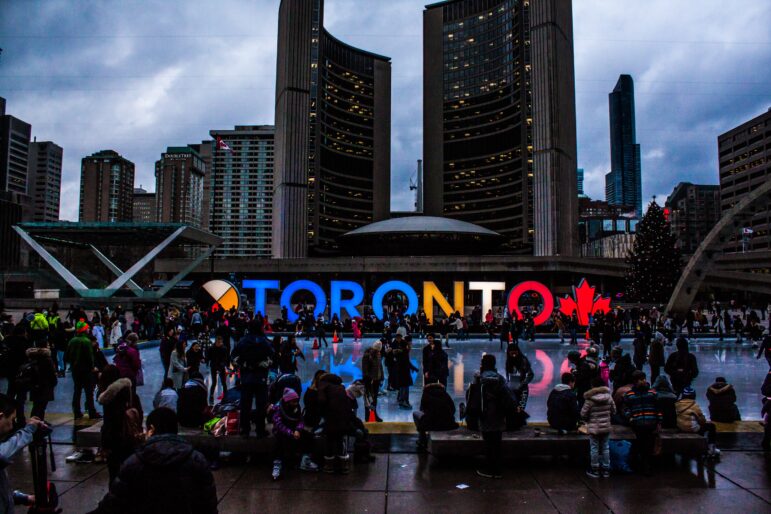Condo sales in the Greater Toronto Area increased by 5.3 per cent year-over-year with 4,747 sold in the first quarter of 2024. The Toronto Regional Real Estate Board released its 2024 Q1 Condo Market Statistics last week, showing the average selling price was down 1 per cent since last year, at $693,754.
In the City of Toronto, which accounted for almost two-thirds of total condo sales, the average price was $723,186, down by 0.5 per cent compared to Q1 2023.
The increased amount of sales may signal healthier buyer intentions as confidence grows in the condo market. “As first-time buying activity increases with lower borrowing costs later this year and into 2025, inventory will be absorbed and market conditions will tighten,” said TRREB Chief Market Analyst Jason Mercer. “Increased competition among condo buyers will result in upward pressure on selling prices.”
A recent survey, commissioned by Toronto developer Devron, highlights this trend, showing that 47 per cent of Torontonians believe condos are viable long-term housing options. Another 40 per cent said it’s a potential option, depending on the unit or building.
“These findings suggest a growing acceptance of condos as permanent residences, where families can thrive, rather than mere transitional housing,” says Pouyan Safapour, president of Devron. “However, despite this positive outlook on long-term condo living, there remains a significant dissatisfaction with the current state of Toronto’s condo landscape, with a staggering 93 per cent of respondents who feel that Toronto needs better-built condos and 79 per cent who believe most condo units are cheaply made.”
Here, Safapour further discusses condo market prospects and how developers can best meet buyer demands, including families.
Where do you see the condo market heading this year in the Greater Toronto Area?
The first half of 2024 has been a slow market for pre-construction sales. This is due to the concurrent effect of record-high interest rates and record completions of condos that were sold in the past three to four years. But there is also another interesting and significant factor at play, and that is we are experiencing a much needed ‘flight to quality and value’. This means that buyers are no longer paying any price, for any project and location, all on the speculation that the market is going to make any purchase a good purchase. The result is that the fewer projects with great quality and location are still selling and holding value, but the many projects with low value product and location are not.
As interest rates begin to lower in the second half of 2024, and the completed condos are absorbed, coupled with an historic population increase, we will see a shift in the market both in terms of absorption and eventually pricing, whereby all projects will experience a rise in sales and pricing. This trend of lower interest rates and depleting inventory will continue into 2025, further increasing sales absorption and pricing. I would agree with economists like Benjamin Tal that there is likely going to be a sharp increase in pricing in condos in 2025. That makes this time a very unique opportunity for buyers, before this shift in the market.
How can developers best meet the demands of future condo buyers?
We need to transform Toronto’s condo landscape and raise the standards of condo living in the city. Our condos can and should be so much more than glass boxes and small suites, with only transitory owners/renters as the targeted occupants. We need to prioritize thoughtful architecture, more livable suite sizes, quality design features like sound and noise insulation, better elevators, and much more, so that they can be homes that are loved by people who live in our condos, and even by those in the neighbourhood living amongst them.
Developers shoulder a significant responsibility and are uniquely positioned to lead this change. Architecture matters, every quality feature matters, and offering a variety of suite sizes of homes that can cater to people and families of all ages and life stages matters.
Another important requirement of building sustainable housing is environmental sustainability, given buildings are one of the largest contributors to greenhouse gas emissions. By focusing on energy efficiency and renewable resources like geothermal heating and cooling, we not only reduce environmental impact but also empower homeowners with lower long-term energy costs. Ultimately, by embracing these principles, as developers, we believe we have the responsibility and opportunity to contribute to making Toronto a happier, healthier and more beautiful place to live.
How can developers and policy makers support the average family in their quest for condo ownership?
Developers and policymakers have distinct responsibilities in supporting the average family’s pursuit of condo ownership as a viable long-term option.
Developers must prioritize creating high-quality, sustainable condo projects that not only enhance Toronto’s vibrancy but also make the city an appealing place to live. The current shortage of quality condo options in Toronto is driving people away from the city, leading to increased traffic, longer commutes, and decreased quality of life. Therefore, developers must focus on building communities that create attractive, highly livable homes that encourage people to stay in their multifamily home long-term.
Policy makers can play a significant role in making condos more viable and affordable. The first major challenge is creating more infrastructure in the city centres: transit, schools, parks, community centres, and hospitals.
City centres have grown rapidly, while all of these essential infrastructures have not, making it hard for people to get the services they and their families need to thrive. Policy makers at all levels of government have also created an extremely inhospitable environment to create housing.
In Canada, we have one of the highest tax rates for multifamily development in the world, while also having one of the highest development approval times in the world. All of this added cost and time makes housing more expensive and slower to deliver. So, if politicians and policy makers are serious about fixing our housing crisis beyond just news headlines, we cannot, as a country, be leading the world in excessive taxation and bureaucracy.
Developers and policy makers can help shape what the next pivotal few decades of development in Toronto looks like. We all need to passionately care about steering it in the right direction because Toronto has the potential to be one of the best cities in the world to live and thrive.








